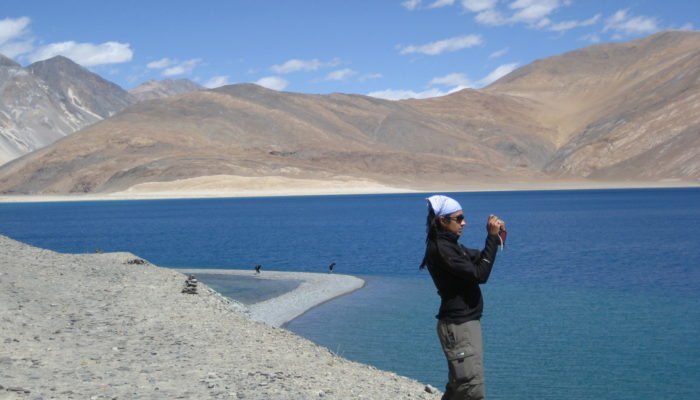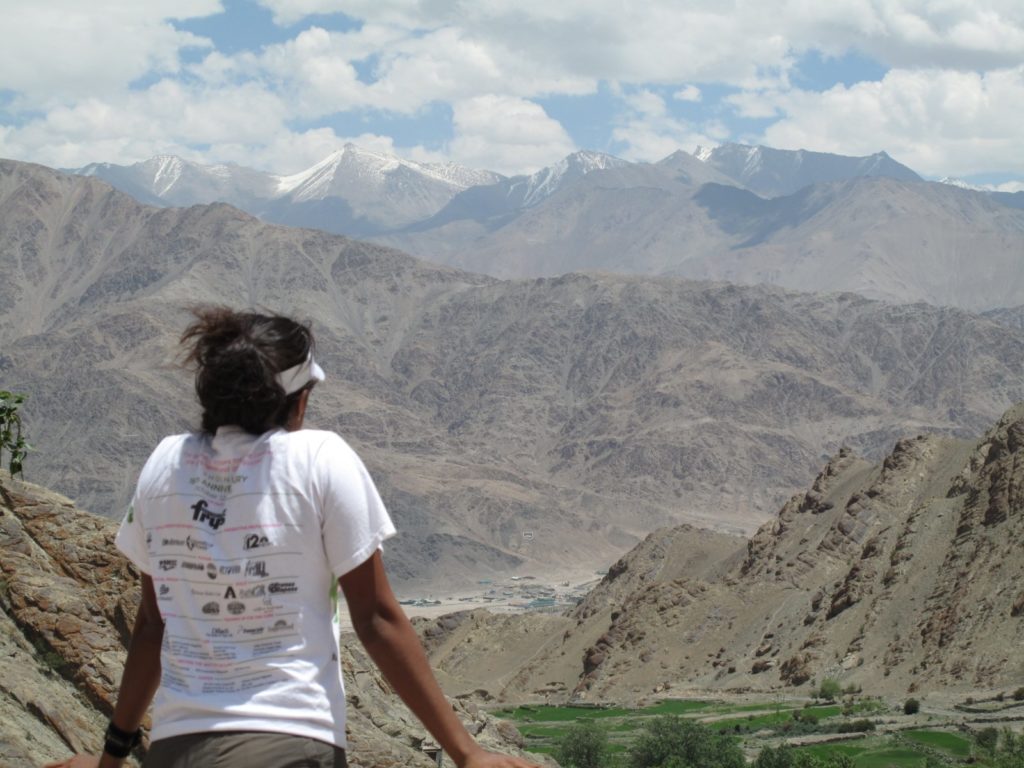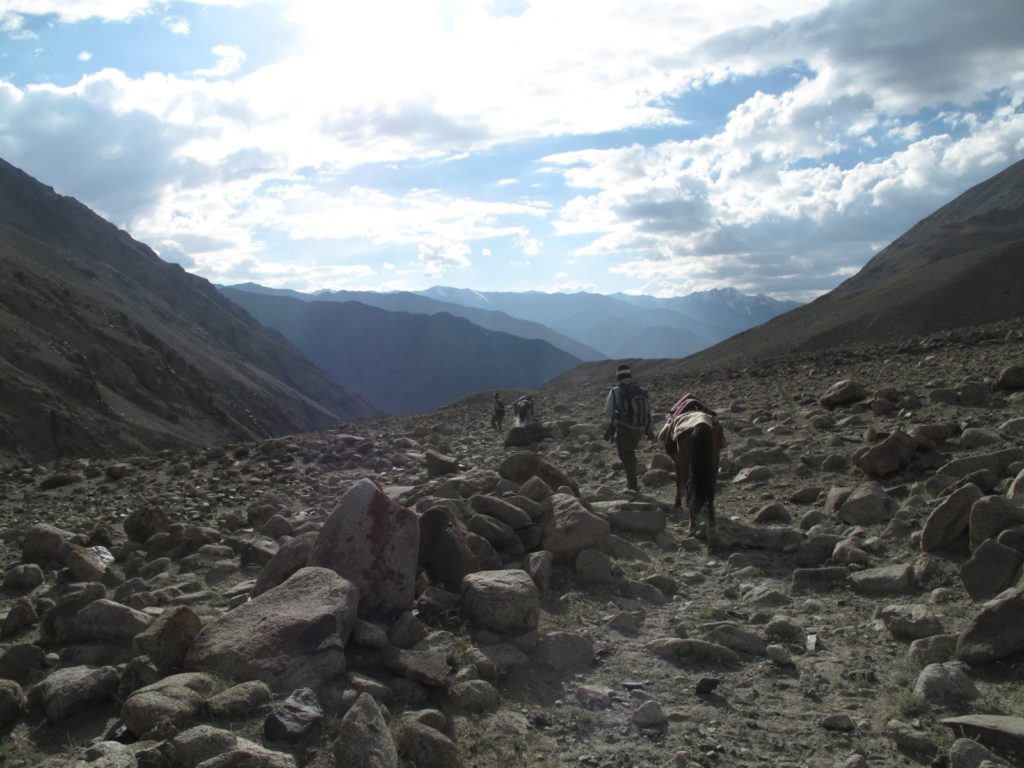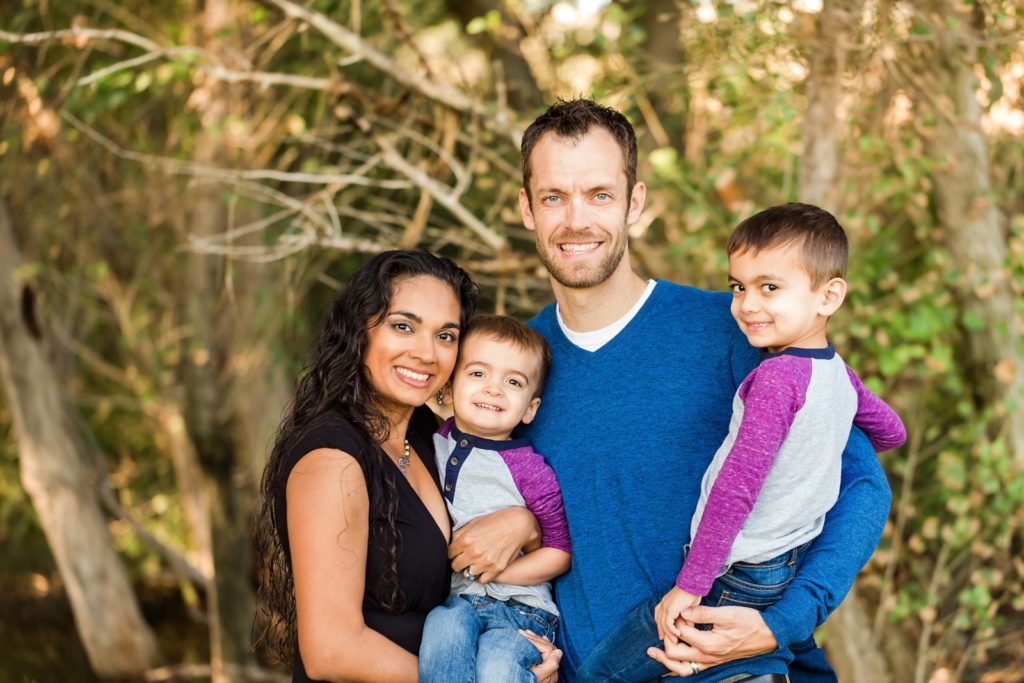
Alka Tripathy-Lang is a freelance science writer based in Chandler, Arizona. She writes mostly about geohazards and creative ways to apply seismology to the world around us.
What is your story, Alka? Why geology?
When I was a little girl, I was fascinated by rocks and fossils. I told anyone who asked that I wanted to be a geologist when I grew up. However, in the throes of my teenage years, I focused on chemistry and lost sight of earth science, which was not offered at my high school.
I began my undergraduate degree at the University of Texas at Austin, without realizing that it’s home to one of the largest geology departments in the United States. On a lark, I chose an introductory geology class as an elective and was smitten all over again. Geologists seemed like detectives, looking to rocks for hints of Earth’s storied past. I promptly changed my major, and upon graduating, continued my master’s studies there with a focus on detrital geochronology. To me, dating rocks provided tantalizing clues toward solving the mysteries of our world.
In 2006, I chose to pursue my Ph.D. at Arizona State University with a focus on low-temperature thermochronology and geochemistry. I spent three exhilarating summers in Ladakh, in the northwestern Indian Himalaya, collecting samples for my doctoral research, which centered on the Indus Basin, a molasse that records the history of Indo-Eurasia collision. I also assisted with other projects, like a comprehensive study of the evolution of the Karakoram fault, led by Dr. Wendy Bohon, who was my fellow student at the time.
Shortly after completing my Ph.D., my partner and I married. He had a job he loved that required him to remain in Arizona. I still wanted to pursue my research and was offered a postdoc at the Berkeley Geochronology Center in California. My postdoc advisor and I settled on a mutually beneficial strategy where I could work half time. I spent most of my salary flying back and forth, renting rooms, and eating out, but this arrangement made my long-distance marriage manageable.
Between constant travel and keeping meticulous track of my hours, my partner and I wanted to start a family. Very quickly, my body signaled that something wasn’t right, and I was diagnosed with polycystic ovarian syndrome. Unable to conceive without a reproductive endocrinologist’s assistance, my half-time postdoc became a full-time blessing. Many women appear to manage infertility seamlessly with full-time academic positions. Yet, balancing numerous doctor’s visits and one’s mental health while keeping productivity high is challenging. My infertility journey was replete with privilege because I had sufficient time for daily doctor visits, and my partner’s health insurance covered much of the cost. Remaining an engaged academic was slightly less difficult than it could have been.

Alka looking north from Hemis Gompa in Ladakh, India, with the Indus Basin molasse in the foreground and the Ladakh batholith in the background. Photo credit: Wendy Bohon.
Did you have kids?
Yes! During my 5.5-year stint as a half-time postdoc, I bore two children. My maternity leave totaled 8 months, considered generous by U.S. standards. By July of 2018, with two children under the age of 4, I had yet to apply for a faculty job. After years of training for one, I realized I wouldn’t excel at something I didn’t want.
What do you do now?
The week after my postdoc ended, I discovered the importance of my network of scientists, academics, and friends. I was contracted by the Incorporated Research Institutions for Seismology, or IRIS, to help with various tasks. Their interest in me was largely based on the work I had done with Dr. Bohon during our contemporaneous Ph.D. studies. One of my responsibilities, writing science highlights for the IRIS website, was, and is, a favorite challenge of mine. The satisfaction of successfully deconstructing complex academic papers into digestible prose for the public is, for me, immense.
Through Twitter, which can be tuned to provide science news and information, I found a science writing externship via Temblor. Over the course of several months, I became a freelance science writer. Freelancing allows me to work from home, enjoy my kids, stay connected to academia, and provide a valuable service for the general public by communicating otherwise incomprehensible information.
Have you experienced or witnessed gender bias in the workplace?
Haven’t we all? I have silly examples, like knobs on a mass spectrometer made to look like a woman’s breasts. A more serious example is the story of a female graduate student who was refused help by her advisor when she reported that a postdoc was demanding intimacy in exchange for help in the laboratory. In that case, she was told to work it out herself because the advisor and postdoc were friends.
Most recently, several co-authors and I were writing up something, and a male coauthor was editing words that he assumed to be mine. In the comments, he wondered whether I had made up certain words, and was treating me less like an equal, and more like someone who needed to be taught. I spoke with him about these comments, explaining that those were the words of another male coauthor. He recoiled and asked why I hadn’t told him that because he would never have spoken to our coauthor that way. He fully recognized that he shouldn’t have been speaking to our coauthor in a denigrating tone, yet somehow it was ok to speak to me like that. Regardless of whether this was the result of gender or some other implicit bias, this behavior is not ok.
How did you deal with it?
In the past, I’ve ignored this kind of behavior. Now, I call it out. I suspect I come off as shrill, even though the same words from a man would be praised. Leaving academia for science communication has helped me find my voice, and now I’m in a position to stand up for other women who can’t say anything for fear of reprisals.
I still experience gender bias, but less so. I occasionally feel like a silly little girl listening to adults, but I now have the experience and the courage to stand up for myself that I didn’t have when I was younger.
What about being an Indian woman in a predominately white male field?
I’ve had some strange experiences because I am an Indian woman. At numerous conferences, I was ignored until people realized who my Ph.D. advisor was. Then, suddenly, they would take me seriously. Interestingly, Indian men were the most disparaging demographic. One even sat me down and told me I should keep my mouth shut because I talked too much and had too many opinions! He never said anything like this to any of the white women. Just me.

Alka and her donkey after a long day of hunting for the Karakoram Fault in Ladakh, India. Photo credit: Wendy Bohon.
Do women perpetuate gender bias? What are the strategies you try to apply in your everyday life to reduce your own gender bias?
Gender bias starts early. Already, my children tell me certain colors are “boy” colors or “girl” colors, or that certain activities are for boys only. This isn’t gender bias in the workplace, but one day, it could be. Every day my partner and I work to unravel these ideas about boys doing “boy things” that have been implanted by society, school, friends… or maybe even us.
In many ways, society today is turning away from gender bias and sexism more than at any other time in history. Yet gender gaps and inequalities persist: why are things not changing faster in your opinion?
Maybe some parts of society are turning away from gender bias, but certainly not all. In a recent interview, the president of the American Association of Petroleum Geologists (AAPG) spoke about how he couldn’t imagine a “female geologist going out in the field in places like Argentina, South America” and other far flung places. In this same interview, he indicated that gender bias isn’t a problem with AAPG, but then talked about how there were traditionally fewer women in the field. There was no thought as to why so few women were in the oil and gas industry. [whatch the YouTube interview here]
A substantial subset of society believes that gender gaps and inequalities are a myth. There’s another subset of the population that believes women are, in fact, less than men. I suggest that things aren’t changing faster because there are large swaths of society who don’t believe this is a problem, or they are actively working against gender equality.
What would you do to help inspire the next generation of female scientists?
This is an excellent question. As a science writer, I try to amplify the voices of other women by either highlighting research led by women or interviewing women for the pieces I write. I especially look for work led by early-career women, including graduate students and postdocs. Receiving recognition early for a job well done helps to build confidence. By bringing such work into the spotlight, I’m doing my part of “Representing the possible!”
If you were to name a person who inspired you during your career, who would (s)he be?
Honestly, I can’t name an individual inspirational woman. Throughout my undergraduate, master’s, and doctoral studies, my peers were my inspiration. My fellow students and postdocs were the women on whom I depended, and from whom I drew strength. This is still true today. My confidantes and counselors comprise a group of women communicators, writers, editors, and academics who continue to amaze me with their successes.

Motherhood is an important part of Alka’s story: “My older son was my miracle infertility baby, and my younger son was my surprise miracle baby” – writes Alka. Photo credit: Annelise Jensen
⇒ Go back to the Blog series
